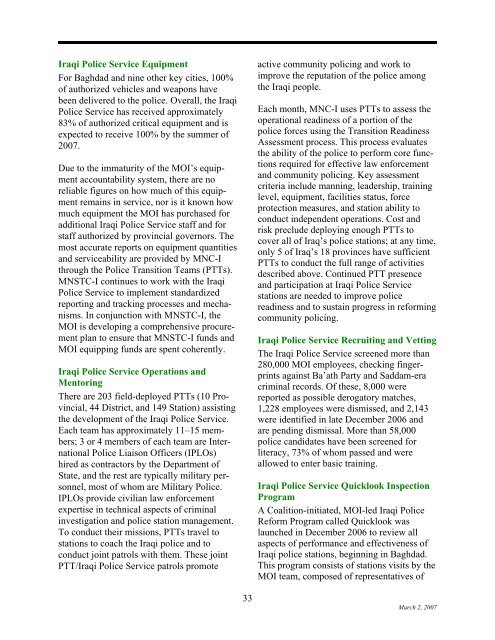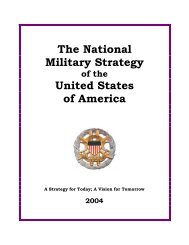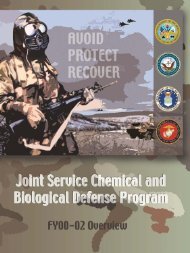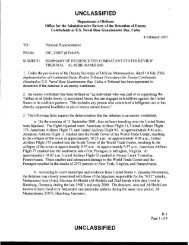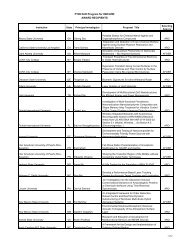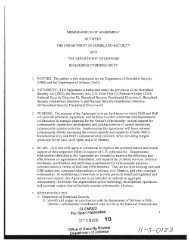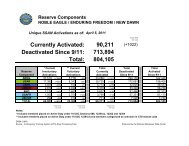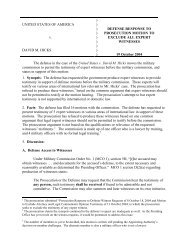Measuring Stability and Security in Iraq - United States Department ...
Measuring Stability and Security in Iraq - United States Department ...
Measuring Stability and Security in Iraq - United States Department ...
Create successful ePaper yourself
Turn your PDF publications into a flip-book with our unique Google optimized e-Paper software.
<strong>Iraq</strong>i Police Service EquipmentFor Baghdad <strong>and</strong> n<strong>in</strong>e other key cities, 100%of authorized vehicles <strong>and</strong> weapons havebeen delivered to the police. Overall, the <strong>Iraq</strong>iPolice Service has received approximately83% of authorized critical equipment <strong>and</strong> isexpected to receive 100% by the summer of2007.Due to the immaturity of the MOI’s equipmentaccountability system, there are noreliable figures on how much of this equipmentrema<strong>in</strong>s <strong>in</strong> service, nor is it known howmuch equipment the MOI has purchased foradditional <strong>Iraq</strong>i Police Service staff <strong>and</strong> forstaff authorized by prov<strong>in</strong>cial governors. Themost accurate reports on equipment quantities<strong>and</strong> serviceability are provided by MNC-Ithrough the Police Transition Teams (PTTs).MNSTC-I cont<strong>in</strong>ues to work with the <strong>Iraq</strong>iPolice Service to implement st<strong>and</strong>ardizedreport<strong>in</strong>g <strong>and</strong> track<strong>in</strong>g processes <strong>and</strong> mechanisms.In conjunction with MNSTC-I, theMOI is develop<strong>in</strong>g a comprehensive procurementplan to ensure that MNSTC-I funds <strong>and</strong>MOI equipp<strong>in</strong>g funds are spent coherently.<strong>Iraq</strong>i Police Service Operations <strong>and</strong>Mentor<strong>in</strong>gThere are 203 field-deployed PTTs (10 Prov<strong>in</strong>cial,44 District, <strong>and</strong> 149 Station) assist<strong>in</strong>gthe development of the <strong>Iraq</strong>i Police Service.Each team has approximately 11–15 members;3 or 4 members of each team are InternationalPolice Liaison Officers (IPLOs)hired as contractors by the <strong>Department</strong> ofState, <strong>and</strong> the rest are typically military personnel,most of whom are Military Police.IPLOs provide civilian law enforcementexpertise <strong>in</strong> technical aspects of crim<strong>in</strong>al<strong>in</strong>vestigation <strong>and</strong> police station management.To conduct their missions, PTTs travel tostations to coach the <strong>Iraq</strong>i police <strong>and</strong> toconduct jo<strong>in</strong>t patrols with them. These jo<strong>in</strong>tPTT/<strong>Iraq</strong>i Police Service patrols promoteactive community polic<strong>in</strong>g <strong>and</strong> work toimprove the reputation of the police amongthe <strong>Iraq</strong>i people.Each month, MNC-I uses PTTs to assess theoperational read<strong>in</strong>ess of a portion of thepolice forces us<strong>in</strong>g the Transition Read<strong>in</strong>essAssessment process. This process evaluatesthe ability of the police to perform core functionsrequired for effective law enforcement<strong>and</strong> community polic<strong>in</strong>g. Key assessmentcriteria <strong>in</strong>clude mann<strong>in</strong>g, leadership, tra<strong>in</strong><strong>in</strong>glevel, equipment, facilities status, forceprotection measures, <strong>and</strong> station ability toconduct <strong>in</strong>dependent operations. Cost <strong>and</strong>risk preclude deploy<strong>in</strong>g enough PTTs tocover all of <strong>Iraq</strong>’s police stations; at any time,only 5 of <strong>Iraq</strong>’s 18 prov<strong>in</strong>ces have sufficientPTTs to conduct the full range of activitiesdescribed above. Cont<strong>in</strong>ued PTT presence<strong>and</strong> participation at <strong>Iraq</strong>i Police Servicestations are needed to improve policeread<strong>in</strong>ess <strong>and</strong> to susta<strong>in</strong> progress <strong>in</strong> reform<strong>in</strong>gcommunity polic<strong>in</strong>g.<strong>Iraq</strong>i Police Service Recruit<strong>in</strong>g <strong>and</strong> Vett<strong>in</strong>gThe <strong>Iraq</strong>i Police Service screened more than280,000 MOI employees, check<strong>in</strong>g f<strong>in</strong>gerpr<strong>in</strong>tsaga<strong>in</strong>st Ba’ath Party <strong>and</strong> Saddam-eracrim<strong>in</strong>al records. Of these, 8,000 werereported as possible derogatory matches,1,228 employees were dismissed, <strong>and</strong> 2,143were identified <strong>in</strong> late December 2006 <strong>and</strong>are pend<strong>in</strong>g dismissal. More than 58,000police c<strong>and</strong>idates have been screened forliteracy, 73% of whom passed <strong>and</strong> wereallowed to enter basic tra<strong>in</strong><strong>in</strong>g.<strong>Iraq</strong>i Police Service Quicklook InspectionProgramA Coalition-<strong>in</strong>itiated, MOI-led <strong>Iraq</strong>i PoliceReform Program called Quicklook waslaunched <strong>in</strong> December 2006 to review allaspects of performance <strong>and</strong> effectiveness of<strong>Iraq</strong>i police stations, beg<strong>in</strong>n<strong>in</strong>g <strong>in</strong> Baghdad.This program consists of stations visits by theMOI team, composed of representatives of33March 2, 2007


